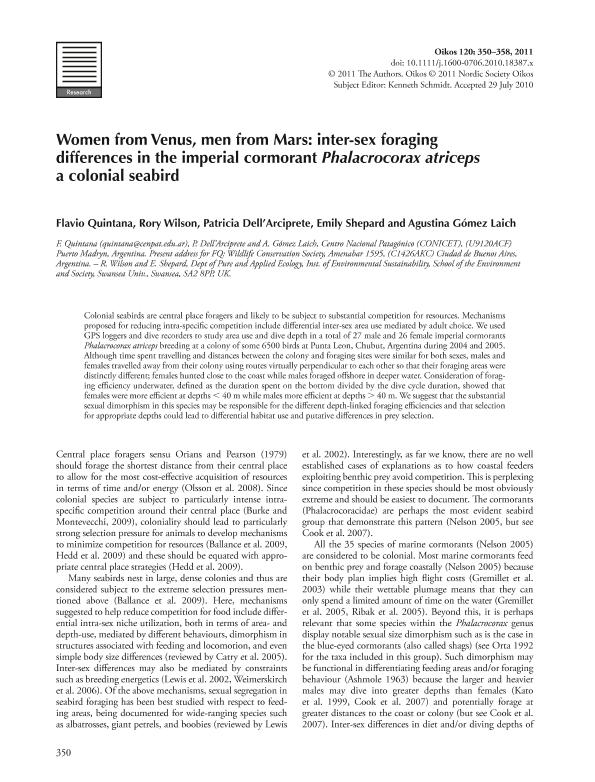Mostrar el registro sencillo del ítem
dc.contributor.author
Quintana, Flavio Roberto

dc.contributor.author
Wilson, Rory P.

dc.contributor.author
Dell'arciprete, Olga Patricia

dc.contributor.author
Shepard, Emily
dc.contributor.author
Gómez Laich, Agustina Marta

dc.date.available
2019-09-25T15:48:10Z
dc.date.issued
2011-03
dc.identifier.citation
Quintana, Flavio Roberto; Wilson, Rory P.; Dell'arciprete, Olga Patricia; Shepard, Emily; Gómez Laich, Agustina Marta; Women from Venus, men from Mars: Inter-sex foraging differences in the imperial cormorant Phalacrocorax atriceps a colonial seabird; Wiley Blackwell Publishing, Inc; Oikos; 120; 3; 3-2011; 350-358
dc.identifier.issn
0030-1299
dc.identifier.uri
http://hdl.handle.net/11336/84404
dc.description.abstract
Colonial seabirds are central place foragers and likely to be subject to substantial competition for resources. Mechanisms proposed for reducing intra-specific competition include differential inter-sex area use mediated by adult choice. We used GPS loggers and dive recorders to study area use and dive depth in a total of 27 male and 26 female imperial cormorants Phalacrocorax atriceps breeding at a colony of some 6500 birds at Punta Leon, Chubut, Argentina during 2004 and 2005. Although time spent travelling and distances between the colony and foraging sites were similar for both sexes, males and females travelled away from their colony using routes virtually perpendicular to each other so that their foraging areas were distinctly different; females hunted close to the coast while males foraged offshore in deeper water. Consideration of foraging efficiency underwater, defined as the duration spent on the bottom divided by the dive cycle duration, showed that females were more efficient at depths < 40 m while males more efficient at depths > 40 m. We suggest that the substantial sexual dimorphism in this species may be responsible for the different depth-linked foraging efficiencies and that selection for appropriate depths could lead to differential habitat use and putative differences in prey selection.
dc.format
application/pdf
dc.language.iso
eng
dc.publisher
Wiley Blackwell Publishing, Inc

dc.rights
info:eu-repo/semantics/openAccess
dc.rights.uri
https://creativecommons.org/licenses/by-nc-sa/2.5/ar/
dc.subject
Imperial Cormorant
dc.subject
Sexual Dimorphism
dc.subject
Foraging Behaviour
dc.subject
Habitat Use
dc.subject.classification
Zoología, Ornitología, Entomología, Etología

dc.subject.classification
Ciencias Biológicas

dc.subject.classification
CIENCIAS NATURALES Y EXACTAS

dc.title
Women from Venus, men from Mars: Inter-sex foraging differences in the imperial cormorant Phalacrocorax atriceps a colonial seabird
dc.type
info:eu-repo/semantics/article
dc.type
info:ar-repo/semantics/artículo
dc.type
info:eu-repo/semantics/publishedVersion
dc.date.updated
2019-09-20T15:12:20Z
dc.journal.volume
120
dc.journal.number
3
dc.journal.pagination
350-358
dc.journal.pais
Reino Unido

dc.journal.ciudad
Londres
dc.description.fil
Fil: Quintana, Flavio Roberto. Consejo Nacional de Investigaciones Científicas y Técnicas. Centro Científico Tecnológico Conicet - Centro Nacional Patagónico; Argentina. Wildlife Conservation Society; Estados Unidos
dc.description.fil
Fil: Wilson, Rory P.. Swansea University; Reino Unido
dc.description.fil
Fil: Dell'arciprete, Olga Patricia. Consejo Nacional de Investigaciones Científicas y Técnicas. Centro Científico Tecnológico Conicet - Centro Nacional Patagónico; Argentina
dc.description.fil
Fil: Shepard, Emily. Swansea University; Reino Unido
dc.description.fil
Fil: Gómez Laich, Agustina Marta. Consejo Nacional de Investigaciones Científicas y Técnicas. Centro Científico Tecnológico Conicet - Centro Nacional Patagónico; Argentina
dc.journal.title
Oikos

dc.relation.alternativeid
info:eu-repo/semantics/altIdentifier/doi/http://dx.doi.org/10.1111/j.1600-0706.2010.18387.x
dc.relation.alternativeid
info:eu-repo/semantics/altIdentifier/url/https://onlinelibrary.wiley.com/doi/full/10.1111/j.1600-0706.2010.18387.x
Archivos asociados
